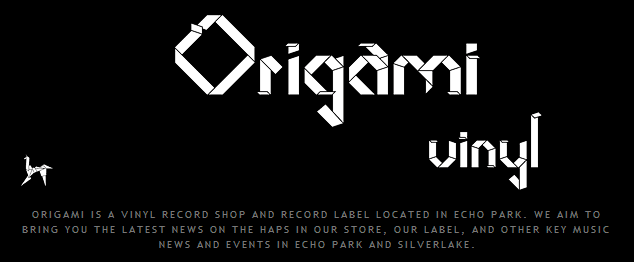Variety Magazine has done a feature regarding the resurgence of vinyl that features Origami, Mississippi Records, Numero Group, Sundazed, EMI, and Rhino. Thanks to Chris for allowing us to be part of this!
NEW GENERATION EMBRACES VINYL'S SPIN
LP Sales Grow, Biz Opens To Indies, Big Labels
By Christopher Morris
Even early on a gray, drizzly October afternoon, several customers could be found browsing at Mississippi Records in Portland, Ore., pawing through the bins of the cramped 650-square-foot store, drawn by the elusive and resurgent mystique of the shop's exclusive product: new and used vinyl LPs.
"When we started, it was 'one man's trash is another man's gold' -- LPs were cheaper and more available," says Eric Isaacson, owner of the six-year-old store and partner in the vinyl-only Mississippi Records label. "Nowadays it seems like the allure is about wanting something more tangible. The digital medium has run its course…The (vinyl) ritual has become important."
The major U.S. labels jettisoned the LP as the principal medium for recorded music in the late '80s as the compact disc took hold, but the long-playing vinyl platter has acquired fresh commercial potential in recent years.
Nielsen SoundScan figures indicate that 1.4 million LPs were sold in the U.S. in 2008; that's a nearly two-fold increase over the 782,000 units sold the previous year.
"There's a huge growth there," says Neil Schield, owner of the seven-month-old vinyl-only store Origami in Los Angeles' Echo Park neighborhood. "We've been extremely steady in business, and we've far exceeded our projections of what we were going to do."
The strong spike in the vinyl business during the current steep decline in CD sales has led some of the majors to once again scrutinize the LP as a revenue source.
Mason Williams, director of A&R at Warner Music Group's catalog arm Rhino Records, noted that the company has issued somewhere between 120 and 150 LP titles since 2003. Pressed on heavy 180-gram vinyl, they retail for $25-$35 each.
Much of Rhino's LP stock is marketed by audiophile websites like Acoustic Sound and Music Direct and independent retailers such as Boston's Newbury Comics and Minneapolis' Electric Fetus. But, Williams added, "There's a handful of Best Buys that have been dabbling in vinyl."
Jason Boyd, VP of catalog sales at EMI Music North America, says the company has released 50 LP titles, priced from $19.98 to $24.98, since September 2008.
"We've scanned over 100,000 units since we started the initiative," Boyd says. "It's a very niche business, but it's pretty substantial…Best Buy, Costco and Amazon are supporting the configuration. The big boys have been supportive."
Ironically, vinyl pressing now has to be contracted independently, since the majors converted their plants to CD replication years ago. Firms like Rainbo Records in Canoga Park, Calif., United Record Pressing in Nashville, and Record Technology in Camarillo, Calif., handle much of the business.
Opportunities exist for companies willing to take on titles in which the majors are not interested. Bob Irwin's 20-year-old independent label Sundazed Music has amassed a catalog of nearly 500 licensed titles, nearly 70% of which were originally issued by the majors.
"It's a lengthy and involved process to make a great (vinyl) record these days, which the major labels for the most part are not equipped to do," Irwin says. "It's labor-intensive.
"Even in the dog days of the mid-'90s, we continued to make vinyl," Irwin adds. "We always had a core audience, and when the (sales) uptick happened, we were perfectly poised to take advantage of that."
Chicago's Numero Group has released its much-admired "Eccentric Soul" series on both LP and CD, while issuing unique vinyl 45s and 12-inch singles. The label's most recent release is "Light: On the South Side," an elaborate LP-only collection of '70s blues-funk packaged with a 132-page photo book.
"We've got kids getting into soul music through hip-hop and indie rock," says Numero's Ken Shipley. "We've also got an older audience who aren't getting what they need from Rhino Handmade."
Origami's Schield, -- a former exec with San Francisco digital music distributor IODA -- says his indie-rock clientele has warmed to the process of spinning vinyl platters.
"There's an experience and an interaction that doesn't exist in any other format," he says. "That whole experience is very unique and very captivating, and it becomes a very social thing."
Tuesday, November 17, 2009
Subscribe to:
Post Comments (Atom)



No comments:
Post a Comment